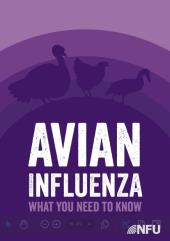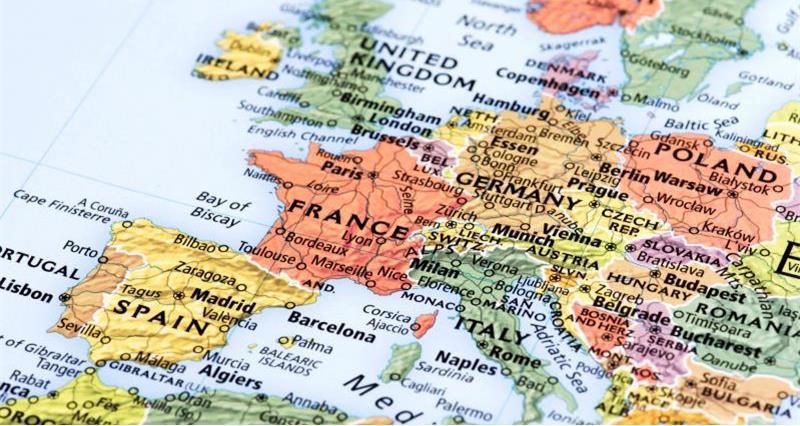Farmer? Have you been asked about this?
Here's how we've been explaining things to the public:
NFU Chief Poultry Adviser Gary Ford said: “British farmers have been acutely aware of the ‘low but heightened’ risk of Avian Influenza (AI) declared by Defra for some weeks now due to outbreaks on the continent and migratory wild birds.
“Farmers will welcome this announcement which will serve as an additional layer of safety to the already stringent measures in place for birds’ health and welfare. And while minimising risk of a disease outbreak is paramount all year round for farmers, those producing only for the Christmas market will have a great deal of investment in a healthy flock at this crucial time of year.
“People food shopping this festive season can be assured that for both British farmers producing poultry meat and egg, bird welfare is a top priority. Buying British ensures the food is produced to the high quality, animal welfare and traceability standards that British farmers are proud to uphold.”
- If you are approached by the media on this issue, you are welcome to call the NFU press team for help
What's going on?
The Government Chief Vet has declared a Prevention Zone introducing enhanced biosecurity requirements for poultry and captive birds, helping to protect them from a strain of avian flu circulating in mainland Europe.
The zone covers England and will remain in place for 30 days. The Scottish and Welsh governments have also imposed housing orders.
Keepers of poultry and other captive birds are now required to keep their birds indoors, or take appropriate steps to keep them separate from wild birds.
Outbreaks of Highly Pathogenic Avian Influenza (H5N8) have been confirmed in poultry and wild birds in several countries across Europe. No cases of H5N8 have been found in the UK and this order is a precautionary measure to help prevent potential infection from wild birds.
Public Health England (PHE) advises that the threat to human health remains very low.
Defra is continuing to monitor the situation closely and has increased its surveillance activity, while keepers are being urged to reinforce biosecurity measures on their premises.
Gary Ford, NFU Chief Poultry Adviser, said: “We welcome this risk-based move by Defra as proportionate given the current risk posed by the wild bird population to commercial poultry.
"Many of our members, particularly on the Eastern side of the country, have been calling for such a decision for several weeks now as the risk posed by AI in the migratory wild bird population throughout Europe to the commercial poultry sector has increased. In the run-up to Christmas, the poultry sector in England is in a critical phase.
"Where it will not be possible practically to house all free range birds farmers are urged to take reasonable measures to prevent contact with wild birds. Given that this is a mandatory housing requirement, producers will be able to retain their free range status – both eggs and poultry meat – for a period of up to twelve weeks from the date of the decision, although the zone is, currently, for 30 days only.”
Defra’s guidance can be found here.
Chief Veterinary Officer Nigel Gibbens said: “While no cases of H5N8 avian flu have been found in the UK, and PHE advises the public health threat is low, we are closely monitoring the situation across Europe and have scaled up surveillance in response to the heightened risk.
“As a precaution, and to allow time for poultry and captive bird keepers to put in place appropriate biosecurity measures, we have declared a 30-day Prevention Zone to reduce the risk of infection from wild birds.
“Even when birds are housed a risk of infection remains so this must be coupled with good biosecurity—for example disinfecting clothing and equipment, reducing poultry movement and minimising contact between poultry and wild birds.”
Poultry keepers are advised to be vigilant for any signs of disease in their birds and any wild birds, and seek prompt advice from their vet if they have any concerns. They can help prevent avian flu by maintaining good biosecurity on their premises, including:
- Cleansing and disinfecting clothing, footwear, equipment and vehicles before and after contact with poultry – if practical, use disposable protective clothing.
- Reducing the movement of people, vehicles or equipment to and from areas where poultry are kept to minimise contamination from manure, slurry and other products and using effective vermin control.
- Thoroughly cleaning and disinfecting housing at the end of a production cycle.
- Keeping fresh disinfectant at the right concentration at all points where people should use it, such as farm entrances and before entering poultry housing or enclosures
- Minimising direct and indirect contact between poultry and wild birds, including making sure all feed and water is not accessible to wild birds.
Clinical signs that poultry keepers should look for in their birds include a swollen head, discolouration of neck and throat, loss of appetite, respiratory distress, diarrhoea and fewer eggs laid – although these vary between species of bird.
Where avian influenza (or Newcastle Disease) is not strongly suspected, but cannot be ruled out, poultry keepers may wish to liaise with their private veterinarian about using the Animal and Plant Health Agency (APHA) ‘testing for exclusion’ regime in GB. This involves submitting samples to a testing service at the APHA’s National Reference Laboratory, Weybridge and can help detect a notifiable avian disease at the earliest opportunity for such cases.
Defra has published advice on biosecurity and how to prevent disease. Wild bird surveillance activity in Great Britain has been increased. If poultry keepers or the general public find dead wild waterfowl (swans, geese or ducks) or gulls, or five or more dead wild birds of other species in the same location, they should report them to the Defra helpline by calling 03459 33 55 77.
Get more advice

Avian Influenza guidance
Download the NFU Avian Flu guide - the links producers might need when there is an AI outbreak and other useful information. You'll find a link to the guide, along with contingency planning and useful links here.
Further advice on AI is available via the links below:
- GOV.UK - Guidance for the public on bird flu
